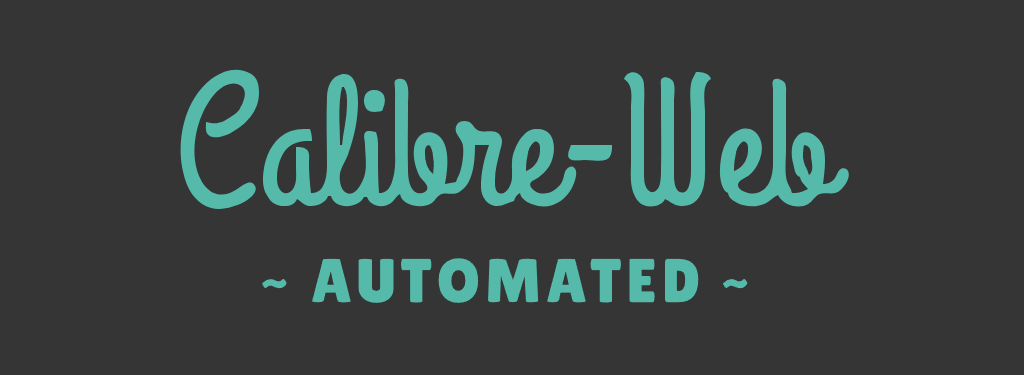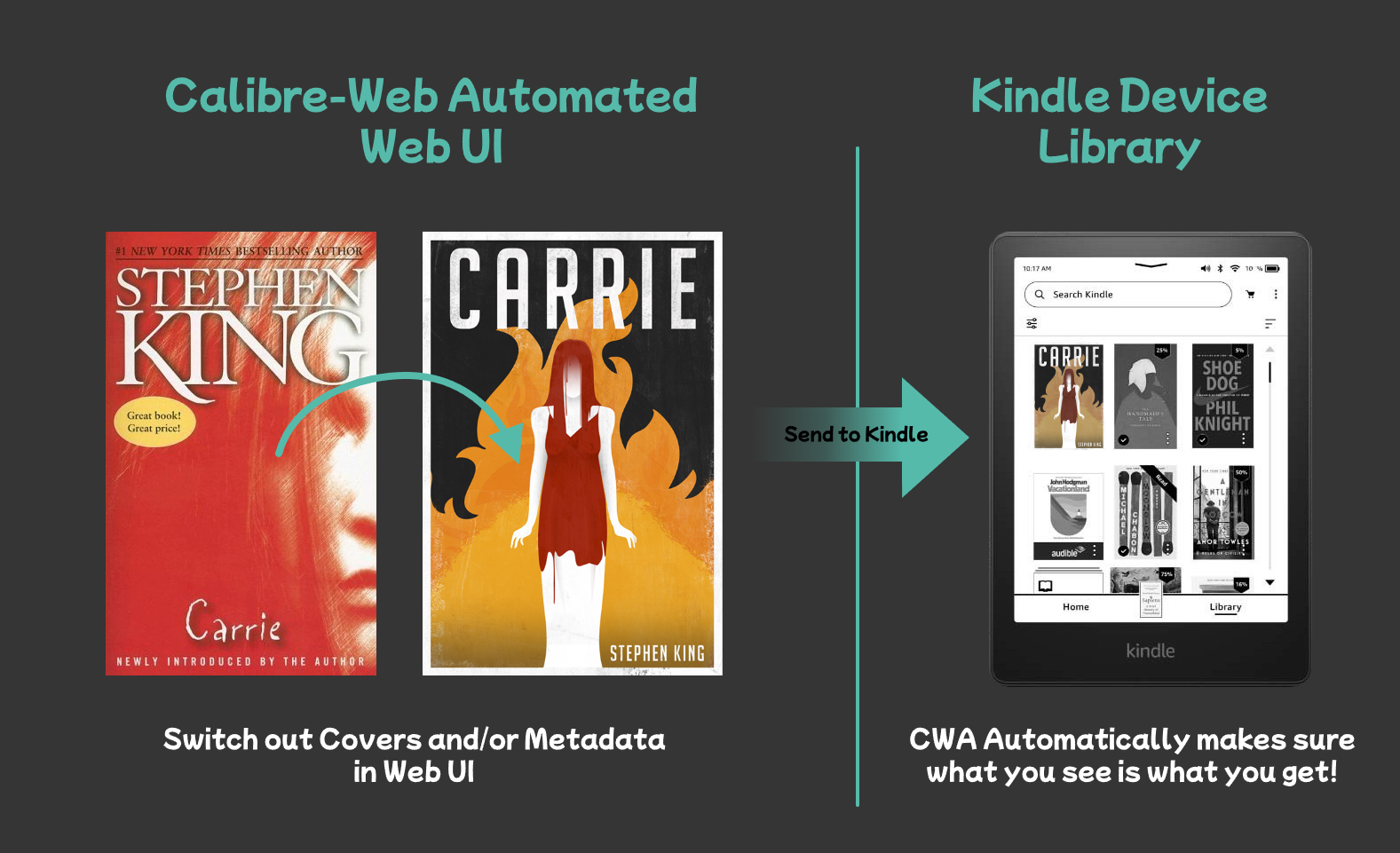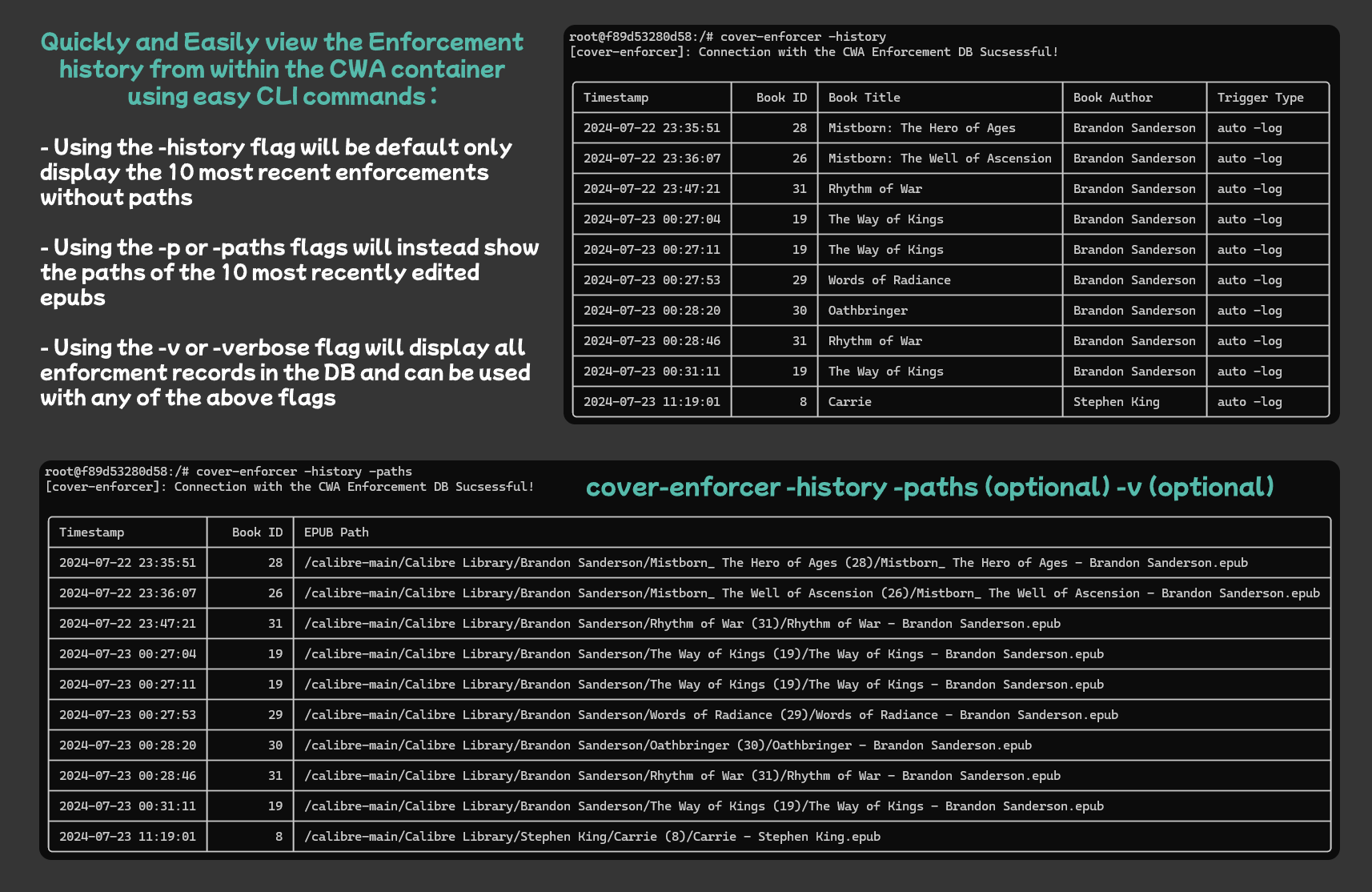Calibre, while a fantastic tool for its age, has several problems when containerised, including its reliance on a KasmVNC server instance for the UI, which is near impossible to use on mobile and is relatively resource-heavy if you're running a small, lower power server like I am.
For many, Calibre-Web has really swooped in to save the day, offering an alternative to a containerised Calibre instance that's quick, easy to set up, resource-light and with a much more modern UI to boot.
However, when compared to full-fat Calibre, it unfortunately lacks a few core features leading many to run both services in parallel, each serving to fill in where the other lacks, resulting in an often clunky, imperfect solution.
After discovering that using the DOCKER_MODS universal-calibre environment variable, you could gain access to Calibre's fantastic eBook conversion tools, both in the Web UI and in the container's CLI, I set about designing a similar solution that could really make the most of all of the tools available to try and fill in the gaps in functionality I was facing with Calibre-Web so that I could finally get rid of my bulky Calibre instance for good. Calibre-Web Automated builds on top of the calibre-web container.
- Easy, Guided Setup via CLI interface
- Automatic imports of
.epubfiles into your Calibre-Web library - Automatic Conversion of newly downloaded books into
.epubformat for optimal compatibility with the widest number of eReaders, library homogeneity, and seamless functionality with Calibre-Web's excellent Send-to-Kindle Function. - User-defined File Structure
- A Weighted Conversion Algorithm:
- Using the information provided in the Calibre eBook-converter documentation on which formats convert best into epubs, CWA is able to determine from downloads containing multiple eBook formats, which format will convert most optimally, ignoring the other formats to ensure the best possible quality and no duplicate imports
- Optional Persistence within your Calibre-Web instance between container rebuilds
- Easy tool to quickly check whether or not the service is currently running as intended/was installed successfully
- Easy to follow logging in the regular container logs to diagnose problems or monitor conversion progress ect. (Easily viewable using Portainer or something similar)
- Logs also contain performance benchmarks in the form of a time to complete, both for an overall import task, as well as the conversion of each of the individual files within it
- Supported file types for conversion:
- .azw, .azw3, .azw4, .mobi, .cbz, .cbr, .cb7, .cbc, .chm, .djvu, .docx, .epub, .fb2, .fbz, .html, .htmlz, .lit, .lrf, .odt, .pdf, .prc, .pdb, .pml, .rb, .rtf, .snb, .tcr, .txt, .txtz
-
Something that's always bothered me as a Kindle user has been Calibre-Web's inability to change the Metadata and Covers stored within the
.epubfiles of our books, despite letting us change these things in the Web UI -
This has resulted in many people, including myself, running instances of both
Calibre-WebAND full-fatCalibre, to make use ofCalibre's much more robust editing tools to change out those ugly covers and keep our Kindle Libraries looking a bit more
_~ a e s t h e t i c ~_ and our metadata correct between devices -
Well, no more! ⏰
-
Using
CWA 1.2.0, whenever you change any Covers or Metadata using theCalibre-WebUI, those changes will now be automatically applied directly to the.epubfiles in your library, as well as in the Web UI itself, meaning that from now on what you see really is what you get! -
- Calibre-Web Automated has always been designed with
.epublibraries in mind due to many factors, chief among which being the fact they are Compatible with the Widest Range of Devices, Ubiquitous as well as being Easy to Manage and Work with - Previously this meant that anyone with
non-epubebooks in their existing Calibre Libraries was unable to take advantage of all ofCalibre-Web Automator's features reliably - So new to Version 1.2.0 is the ability for those users to quickly and easily convert their existing eBook Libraries, no matter the size, to
.epub Version 3format using a one-step CLI Command from within the CWA Container - This utility gives the user the option to either keep a copy of the original of all converted files in
/config/original-libraryor to trust the process and have CWA simply convert and replace those files (not recommended) - Full usage details can be found here
- Calibre-Web Automated has always been designed with
-
- Built-in command-line tools now also exist for:
- Viewing the Edit History of your Library files (detailed above)
- Listing all of the books currently in your Library with their current Book IDs
- Manually enforcing the covers & metadata for ALL BOOKS in your library using the
cover-enforcer -allcommand from within the container (RECOMMENDED WITH FIRST TIME USE) - Manually Enforcing the Covers & Metadata for any individual books by using the following command
cover-enforcer --dir <path-to-folder-containing-the-books-epub-here>
- Full usage and documentation for all new CLI Commands can be found here
- Built-in command-line tools now also exist for:
- In combination with the New Cover & Metadata Enforcement Features, a database now exists to keep track of any and all enforcements, both for peace of mind and to make the checking of any bugs or weird behaviour easier, but also to make the data available for statistical analysis or whatever else someone might want to use the data for
- Full documentation can be found below here
IMPORTANT NOTE: ⚡ Current users of Calibre-Web Automated versions before 1.2.0 should perform a fresh install using the new DockerHub image method below to ensure stability and to keep up-to-date with future bugfixes and updates
- Adding buttons to the Web UI to enable easier execution of features like full library conversion and others currently only available through the command-line interface
- Reworking the book ingest system to be more robust and reliable when used with drives with slow transfer speeds
- Please suggest any ideas or wishes you might have! I'm open to anything!
---
services:
calibre-web-automated:
image: crocodilestick/calibre-web-automated:latest
container_name: calibre-web-automated
environment:
- PUID=1000
- PGID=100
- TZ=UTC
volumes:
- /path/to/config/folder:/config
- /path/to/the/folder/you/want/to/use/for/book/ingest:/cwa-book-ingest
- "/path/to/your/calibre/library:/calibre-main/Calibre Library"
#- /path/to/where/you/keep/your/books:/books #Optional
#- /path/to/your/gmail/credentials.json:/app/calibre-web/gmail.json #Optional
ports:
- 8084:8083 # Change the first number to change the port you want to access the Web UI, not the second
restart: unless-stopped
- Explanation of the Container Bindings:
- /config - Can be any empty folder, used to store logs and other miscellaneous files that keep CWA running
- /cwa-book-ingest - ATTENTION
⚠️ - All files within this folder will be DELETED after being processed. This folder should only be used to dump new books into for import and automatic conversion - /calibre-main/Calibre Library - This should be bound to your Calibre library folder where the
metadata.dbfile resides within.- If you don't have an existing Calibre Database, create a folder for your library, place the
metadata.dbfile from the project's GitHub page within it, and bind it to/calibre-main/Calibre Libraryshown above. Follow the steps below after building the container
- If you don't have an existing Calibre Database, create a folder for your library, place the
- /books (Optional) - This is purely optional, I personally bind /books to where I store my downloaded books so that they accessible from within the container but CWA doesn't require this
- /gmail.json (Optional) - This is used to setup Calibre-Web and/or CWA with your gmail account for sending books via email. Follow the guide here if this is something you're interested in but be warned it can be a very fiddly process, I would personally recommend a simple SMTP Server
- By default,
/cwa-book-ingestis the ingest folder bound to the ingest folder you entered in the Docker Compose template however should you want to change any of the default directories, use thecwa-change-dirscommand from within the container to edit the default paths
- Open your browser and navigate to http://localhost:8084 or http://localhost:8084/opds for the OPDS catalog
- Log in with the default admin credentials (below)
- If you don't have an existing Calibre database, you can use the
metadata.dbfile above- This is a blank Calibre-Database you can use to perform the Initial Setup with
- Place the
metadata.dbfile in the the folder you bound to/calibre-mainin your Docker Compose
- During the Web UI's Initial Setup screen, Set Location of Calibre database to the path of the folder to
/calibre-mainand click "Save" - Optionally, use Google Drive to host your Calibre library by following the Google Drive integration guide
- Configure your Calibre-Web instance via the admin page, referring to the Basic Configuration and UI Configuration guides
- Add books by having them placed in the folder you bound to
cwa-book-ingestin your Docker Compose
Username: admin
Password: admin123
- If your Calibre Library contains any ebooks not in the
.epubformat, from within the container run theconvert-librarycommand.- Calibre-Web Automated's extra features only work with epubs and so failure to complete this step could result in unforeseen errors and general unreliability
- Full usage can be found below in the Usage Section however the following command will automatically convert any non-epubs to epubs and store the original files in
/config/original-library:
convert-library --keep
- Drop a book into your ingest folder and check everything is working correctly!
- This method is only recommended for developers or those who would like to set their own directories using the provided Setup Wizard
- To begin this installation method, you'll need to use the Docker Compose below to set up a base container for you to perform the installation within
- The image provided is a snapshot of the official Calibre-Web release from mid June 2024. This is the image that Calibre-Web Automated was built upon and currently Calibre-Web Automated is not compatible with more recent versions of Calibre-Web
---
services:
calibre-web:
image: crocodilestick/calibre-web-base
container_name: calibre-web-automated
environment:
- PUID=1000
- PGID=100
- PATH=/lsiopy/bin:/usr/local/sbin:/usr/local/bin:/usr/sbin:/usr/bin:/sbin:/bin
- HOME=/root
- LANGUAGE=en_US.UTF-8
- LANG=en_US.UTF-8
- TERM=xterm
- S6_CMD_WAIT_FOR_SERVICES_MAXTIME=0
- S6_VERBOSITY=1
- S6_STAGE2_HOOK=/docker-mods
- VIRTUAL_ENV=/isiopy
- LSIO_FIRST_PARTY=true
- TZ=Europe/Berlin
- DOCKER_MODS=linuxserver/mods:universal-calibre
- OAUTHLIB_RELAX_TOKEN_SCOPE=1 #Optional
volumes:
- /path/to/config/folder:/config
- /path/to/the/folder/you/want/to/use/for/book/ingest:/cwa-book-ingest
- "/path/to/your/calibre/library:/calibre-main/Calibre Library"
- /path/to/where/you/keep/your/books:/books
- /path/to/your/gmail/credentials.json:/app/calibre-web/gmail.json #Optional
ports:
- 8083:8083 # Change the first number to change the port you want to access the Web UI, not the second
restart: unless-stopped
- Download the
calibre-web-automatorfolder from this repo, unzip it, and then place thecalibre-web-automatorfolder inside into the folder bound to your/configvolume - Next, use the following command to gain access to the container's CLI, replacing calibre-web with the name of your Calibre-Web container if it differs:
docker exec -it calibre-web bash
- Navigate inside the calibre-web-automator that you previously placed within your
/configdirectory with the following command:
cd /config/calibre-web-automator
- Make sure the
setup-cwa.shis executable with the following command:
chmod +x setup-cwa.sh
- Now initiate the install with the following command:
./setup-cwa.sh
- When prompted, follow the on-screen instructions to create and enter the paths of the directories the program needs to function.
- The folders can be wherever you like but they must be in a persistent volume like in your
/booksbind, otherwise they and their contents won't be persistent between rebuilds of the container
- The folders can be wherever you like but they must be in a persistent volume like in your
- When the setup is complete, we need to restart the container for the changes to take effect. You can do so by using
exitto return to your main shell and then running the following command:
docker restart calibre-web` or `docker restart <replace-this-with-the-name-of-your-calibre-web-container>
- Once the container is back up and running, you should be good to go! To check however, do the following:
- Then run the included testing script with
cwa-checkanywhere in the terminal to verify your install. - All three prompts should return green, indicating that the new
calibre-scanandbooks-to-process-scanservices are working properly. - If one or both of the services return red indicating that they are not running, rebuild your Calibre-Web container using the
docker-composeabove and retry the installation process.
- Then run the included testing script with
As you may know, every time you rebuild a docker container, anything that isn't include in the source image or saved to a persistent volume, is gone and the container returns to it's stock state.
This option sounds much harder than it really is if you've never done it before but it's actually shockingly easy and currently the best option now the developer of Calibre-Web is sunsetting further development of the project.
- Successfully install CWA using the steps above and confirm it's working by running the included `check-cwa-install.sh' binary from the CLI of your Calibre-Web container as described above in Step 7
- While the container is running, from your main shell (use
exitto return to your main shell if your still in the container's CLI) run the following command to generate an image of your newly modified Calibre-Web container, exactly as it's currently configured:
docker commit calibre-web calibre-web-automated
- Replace
calibre-webwith the name of your Calibre-Web container if it differs and you can also replacecalibre-web-automatedwith whatever name you like
- Once the process is finished, you can check the image was successfully created using the following command to list all current available docker images on your system:
docker images
- Once you've confirmed the image was created successfully, edit your docker compose file so that the variable
imageis now as follows:
---
services:
calibre-web:
image: calibre-web-automated:latest
container_name: calibre-web
environment:
...
- Now the image variable should read
image: calibre-web-automated:latestorimage: <your-chosen-image-name-here>:latest
- Finished! 🎉 Now every time you rebuild your container, CWA as well as any other changes you may have made will remain 👍
This wouldn't be my preferred method but if you never really touch your containers the above may be overkill for you.
- Simply move your newly downloaded or existing eBook files to the ingest folder which is
/cwa-book-ingestby default or whatever you designated during setup if using the Script Install method. Anything you place in that folder will be automatically analysed, converted if necessary and then imported into your Calibre-Web library.- I personally use a script that my instance of qBittorrent will automatically execute upon finishing a download with the category 'books' to fully automate the process however there's an infinite number of configurations out there so do whatever works best for your needs!
usage: cover-enforcer [-h] [--log LOG] [--dir DIR] [-all] [-list] [-history] [-paths] [-v]
Upon receiving a log, valid directory or an "-all" flag, this script will enforce the covers and metadata of the corresponding books, making sure that each are correctly stored in
both the epubs themselves and the user's Calibre Library. Additionally, if an epub happens to be in EPUB 2 format, it will also be automatically upgraded to EPUB 3.
options:
-h, --help show this help message and exit
--log LOG Will enforce the covers and metadata of the books in the given log file.
--dir DIR Will enforce the covers and metadata of the books in the given directory.
-all Will enforce covers & metadata for ALL books currently in your calibre-library-dir
-list, -l List all books in your calibre-library-dir
-history Display a history of all enforcements ever carried out on your machine (not yet implemented)
-paths, -p Use with '-history' flag to display stored paths of all epubs in enforcement database
-v, --verbose Use with history to display entire enforcement history instead of only the most recent 10 entries
usage: convert-library [-h] [--replace] [--keep] [-setup]
Made for the purpose of converting ebooks in a calibre library not in epub format, to epub format
options:
-h, --help show this help message and exit
--replace, -r Replaces the old library with the new one
--keep, -k Creates a new epub library with the old one but stores the old files in /config/original-library
-setup Indicates to the function whether or not it's being ran from the setup script or manually (DO NOT USE MANUALLY)
- If you ever need to change the locations of your ingest, import and/ or calibre-library folders, use the
cwa-change-dirscommand from anywhere within the container's terminal to open the json file where the paths are saved and change them as required.
- Simply run the following command from within the container:
cwa-check - If all 3 services come back as green and running they are working properly, otherwise there may be problems with your configuration/install
- I've now been daily driving this version of Calibre-Web Automated (formerly Calibre-Web Automator) for a couple weeks now and it now does everything I need for my reading workflow, I personally love the new features and hope you do to!
- I will continue to maintain this project but as to new features I'm very much open to requests so please reach out with any suggestions or ideas you might have and I'll do my best to implement them!


